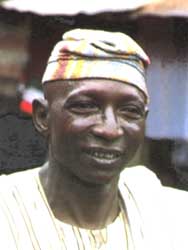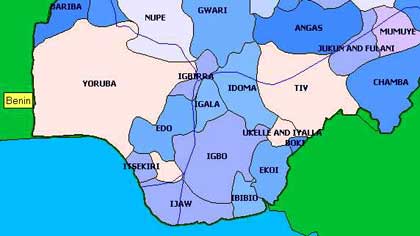
THE YORUBA ETHNIC NATION
 The
area occupied by the Yoruba ethnic nation is situated to the southwest of the
country. In pre-European culture days, the area contained many kingdoms among
which the Ife, Oyo, Egba, Ijebu and Ekiti were dominant. The culture area and
the Edo area to the east, have much in common especialiy in political
institutions and art work. Fulani influence reached the northern portions of the
Yoruba culture area, especially in the early decades of the 19th century. Hence,
among other things, about 40% of the inhabitants are adherents of the Islamic
religion. The southern parts were also exposed to European cultural influences
probably much earlier than many other parts of the country. Such influences
penetrated from the coastal area, especially Lagos and Badagry from where
diffusion to the hinterland took place. Most of the male inhabitants are farmers.
Central Yorubaland is the main cocoa growing part of the country. The women are
skilled traders.
The
area occupied by the Yoruba ethnic nation is situated to the southwest of the
country. In pre-European culture days, the area contained many kingdoms among
which the Ife, Oyo, Egba, Ijebu and Ekiti were dominant. The culture area and
the Edo area to the east, have much in common especialiy in political
institutions and art work. Fulani influence reached the northern portions of the
Yoruba culture area, especially in the early decades of the 19th century. Hence,
among other things, about 40% of the inhabitants are adherents of the Islamic
religion. The southern parts were also exposed to European cultural influences
probably much earlier than many other parts of the country. Such influences
penetrated from the coastal area, especially Lagos and Badagry from where
diffusion to the hinterland took place. Most of the male inhabitants are farmers.
Central Yorubaland is the main cocoa growing part of the country. The women are
skilled traders.
Urbanisation has been most developed in the Yoruba culture area. A high
proportion of the large cities in Nigeria especially those that flourished in
pre-European days, are found in Yorubaland. Tropical Africa’s largest
metropolis, Ibadan, is located in this culture area.
Political organisation based on kingdoms was also highly developed.
Some of the traditional chiefs still hold their own in the scheme of things in
the country.

Ricerca Ing. F.P. Di Giacomo - Dati e cartografia in internet: Alpha Consult S.r.l - Web: G. Cerica |
|||